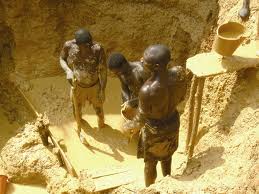Special topics
 Illegal miners operating in some parts of the Northern and Upper West Regions, are now using metal detectors, mainly owned by foreigners, to pick gold nuggets.
Illegal miners operating in some parts of the Northern and Upper West Regions, are now using metal detectors, mainly owned by foreigners, to pick gold nuggets.
There is a high patronage from the local people who are employed to dig to expose and loose the ground to enable the detectors detect and pick the gold nuggets.
These illegal operators persist in the Bole District in the Northern Region and Wa East, Nadowli and Jirapa Districts in the Upper West Region, and have a total labour force of 13, 500 as compared to 1,000 in the regularized sector.
Mr Victor Atsu Amekor, District Officer of the Minerals Commission, made these disclosures at a Mid-Year Review Meeting of Small-Scale Mining Department in Wa.
He said there has been a reduction in the establishment of illegal processing sites by foreigners, mainly Burkinabe, who used cyanide to reprocess tailings for gold, due to the introduction of the use of metal detectors.
He said, many of the miners, especially those in the Upper West Region, had consistently expressed their willingness to regularize their activities.
The challenge, he explained, has however been that almost all the areas were already subjects of mineral licences, and that had resulted in the frustration of the miners.
Mr Amekor said lack of blocked out areas, especially in the Upper West Region, reluctance of miners to relocate to available blocked out areas, uncertainty of the viability of block compared to current location and ethnic differences were challenges facing the sector.
He also mentioned confusion of mineral and surface right by traditional authorities, involvement of some traditional leaders in illegal activities and competition for land use and the subsequent encroachment of small-scale miners on large-scale concessions with the resultant security concerns, as some of the challenges militating against the development of the sector.
Mr Amekor suggested that education on small-scale mining be intensified, while efforts were made towards regularizing some of the illegal activities, especially in the Bole and Wa East areas.
He said due consideration should also be given to adopting the metal detector concept in suitable areas while large-scale mining companies also consider ceding off portions of their concessions, especially areas of low interest and less insecure to their operations to small-scale miners.
Dr Tony Aubyn, Chief Executive Officer of the Minerals Commission, said small-scale mining was important because it was an area that could bring in more money to Ghana.
He appealed to illegal operators to mobilize themselves and form groups and obtain licences to qualify them to operate, but not to take the law into their own hands, or think that because the land was closer to them, they could mine without licence.
He disclosed that of the 1.4 million ounces of gold mined in Ghana last year, the gold did not benefit the people, and government had to go elsewhere to look for money for the development of the country.
Many of the miners have lost their lives, some maimed and the environment degraded while communities in which the mining take place, have not also benefited.
Dr Aubyn said the Commission was prepared to provide technological know-how to the miners, and as well establish a plant pool to help facilitate their operations, to secure the environment from degradation.
He said the support was to bring about efficient use of equipment to enable small-scale miners to graduate to large scale mining, phttps://www.reportingoilandgas.org/wp-admin/post-new.phprovide employment for the youth and also bring in more money to the economy.
The Chief Executive Officer called for improved relations between the Commission and traditional rulers, and urged them to apply for licences for their community members to work on their small-scale mining areas to improve the local economy.
Source: Ghanaweb
Get the latest news and updates on Ghana’s oil and gas value chain by following us Reporting Oil and Gas on twitter @oilgasghana and like our facebook page and get at us on Google+. Subscribe to our group to get update